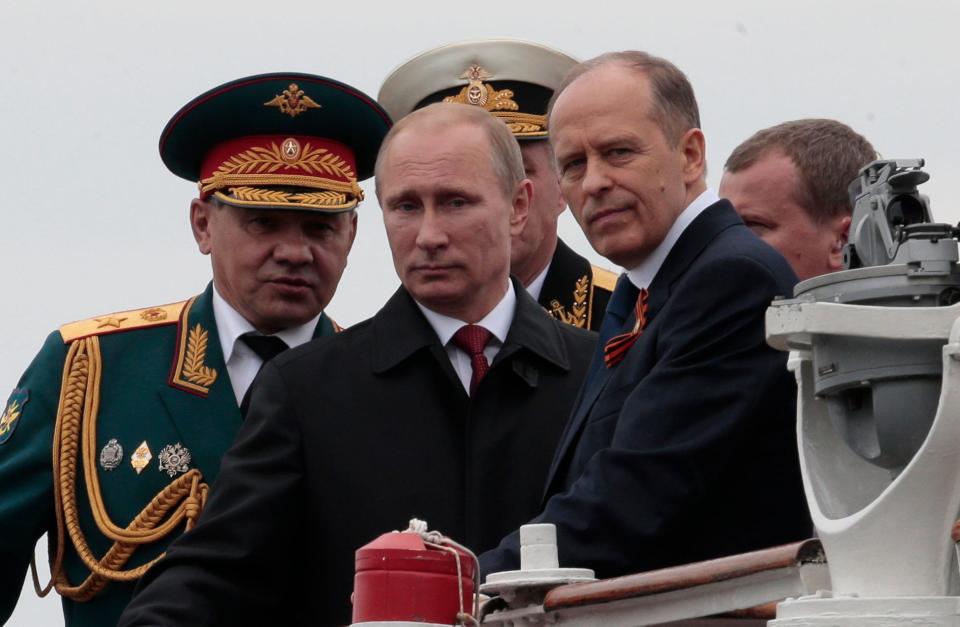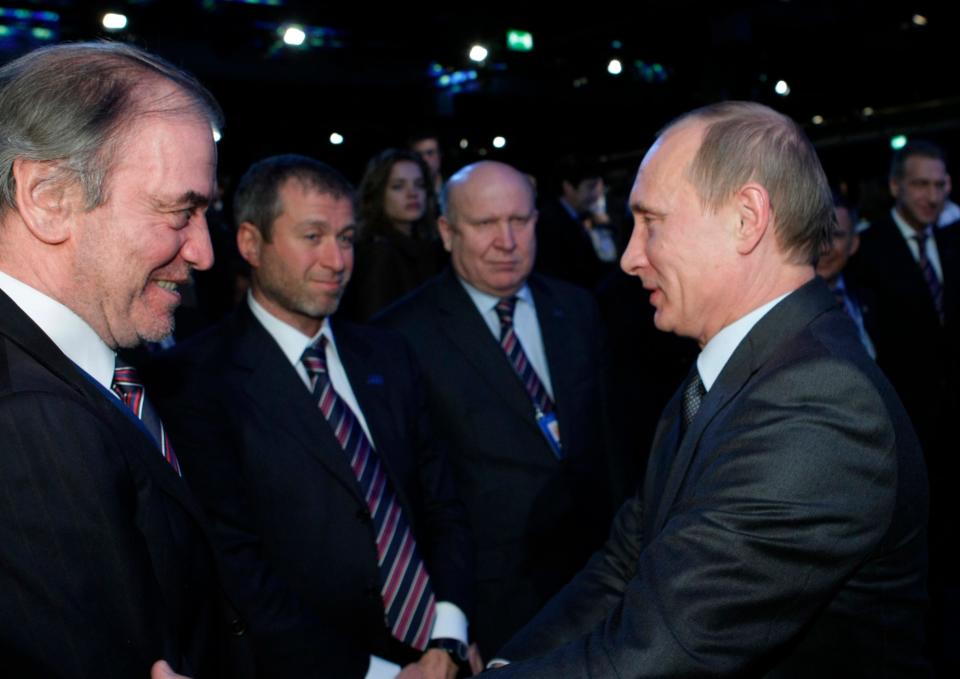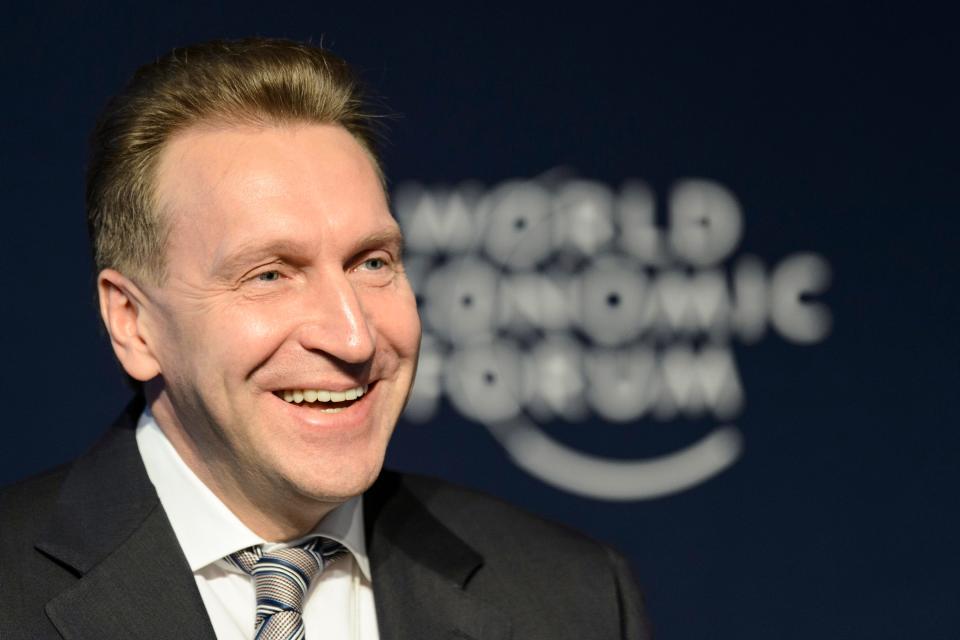Biden hits Russia's yacht-riding rich with sanctions. Will that blunt Putin's Ukraine invasion?
- Oops!Something went wrong.Please try again later.
- Oops!Something went wrong.Please try again later.
WASHINGTON – They own professional sports teams, travel the world in super yachts and stash their billions in Western real estate.
Russia's wealthy oligarchs and political elites flaunt a level of unmatched in-your-face affluence across the world. This week, their wealth and connections to Russian President Vladimir Putin made some of them targets of President Joe Biden's sanctions in response to the Kremlin’s military invasion of Ukraine.
But if the Biden administration really wants to hurt Russian oligarchs enough to rein in Putin's actions in Ukraine, it needs to hit them much harder – and hit a lot more of them, U.S. officials and kleptocracy some experts -- including some U.S. lawmakers -- told USA TODAY.
Biden and his national security team announced several rounds of sanctions in recent days this week that they said would cause severe economic and political hardship for Putin, Russian state-owned banks and some of those in his inner circle.
The European Union and allies such as the United Kingdom made similar moves to isolate Russia – and some Kremlin elites – from global financial markets. On Sunday, EU Commission President Ursula von der Leyen announced the shutdown of EU airspace for Russian-owned, Russian registered or Russian-controlled aircraft.
"They won’t be able to land in, take off or overfly the territory of the EU," von der Leyen tweeted. "Including the private jets of oligarchs."
And Swiss President Ignazio Cassis said Sunday that it was "very probable" that neutral Switzerland would follow the EU's lead and also sanction Russia and freeze Russian assets in the global banking center.
“The sanctions we impose exceed anything that's ever been done," Biden said in a wide-ranging White House address and news conference Thursday. “The sanctions we imposed have generated two-thirds of the world joining us. They are profound sanctions.”
The U.S. sanctions announced Tuesday targeted five people – two oligarchs and their sons and the chairman of a prominent bank with links to the Russian military. Thursday's sanctions targeted seven more Russians: three sons of Putin associates, a wife and three senior banking officials. Friday afternoon, the White House announced it would sanction Putin himself, as well as Foreign Minister Sergey Lavrov, a day after the European Union announced a similar measure.
Saturday, the United States and its European allies agreed to remove “selected” Russian banks from the international SWIFT messaging system, which allows for the movement of financial transactions.
This week’s crackdown leaves open the door to further sanctions in an effort to increase pressure on Putin, Biden said. “Let's have a conversation in another month or so to see if they're working,” he said.
By any measure, the new rounds of U.S. financial blockages issued this week go far beyond what has been done to pressure Putin into curbing his rogue behavior, White House officials said. The sweeping actions would cause extreme hardship for some of Russia’s largest financial institutions and a small handful of Russian oligarchs and kleptocrats who Biden said use them as their own “glorified piggy bank.”
The United States is also moving to restrict exports of technology to Russia and freezing potentially trillions of dollars in Russian assets. Those sanctions "will isolate Russia from the global financial system, shut down its access to cutting-edge technology and undercut Putin's strategic ambitions to diversify and modernize his economy,” Biden's deputy national security adviser Daleep Singh said Thursday.
The decision to target family members was done to send a message that the oligarchs can't protect their money from sanctions, Biden said. They include Sergei Sergeevich Ivanov, Andrey Patrushev and Ivan Igorevich Sechin, the sons of three of Putin’s closest allies, including previously sanctioned Russian oil magnate and longtime Putin confidant Igor Ivanovich Sechin, according to U.S. Treasury documents.
Other Russian oligarchs and elites sanctioned by the United States this week include Aleksandr Vasilievich Bortnikov, director of Russia’s feared Federal Security Service or FSB, the successor to the KGB, and his son Denis; Petr Mikhailovich Fradkov, chairman and CEO of PSB, or Promsvyazbank, which the Biden administration said funds Russian military activities; and Sergei Vladilenovich Kiriyenko, first deputy chief of staff of the presidential office, and his son Vladimir.
"They share in the corrupt gains of the Kremlin policies and should share in the pain as well," Biden said.

Russian elites share in Kremlin gains
One high-profile Russian oligarch who once again escaped U.S. sanctions this week is Roman Abramovich, owner of the London-based Chelsea soccer team and two super yachts that are each much longer than an NFL football field. A billionaire businessman with a wide portfolio of holdings in Russia and globally, Abramovich is described as “one of the key enablers and beneficiaries of the Kremlin’s kleptocracy, with significant ties to, and assets in the West" by an anti-corruption foundation founded by imprisoned opposition leader Alexei Navalny.
A former CIA officer who goes by the pseudonym Alex Finley said a marina in Barcelona, Spain, was home on the same day in January to Abramovich’s yacht Solaris and the super yachts of three other Putin cronies, including Andrei Kostin, chief executive of one of Russia's largest banks, VTB, who was sanctioned by the United States in 2018, along with others. Those sanctions were for a "range of malign activity around the globe," including Russia's occupation of Crimea, its supplying Bashar Assad's regime in Syria with weapons to bomb civilians and its attempts to subvert Western democracies, including the U.S. presidential election two years earlier.
Kostin was not included in the latest round of sanctions, but the bank was, as well as numerous subsidiaries. The Biden administration targeted two of his deputies, Andrey Sergeyevich Puchkov and Yuriy Alekseyevich Soloviev, for taking “advantage of their closeness to the Russian power vertical to advance the interests of the Russian state while maintaining an extravagant standard of living,” the Treasury documents say.
An investigation conducted by Navalny's foundation concluded that Kostin is "a key facilitator of corrupt money flows related to the operation of the Russian government and security services and the personal fortunes of many senior Russian officials."
“Russia is a great place to make money, but when it comes time to spend it, the West is the oligarchs' preferred playground. They buy luxury goods in Milan, mega-yachts in Germany, villas in the south of France and football clubs in the U.K.,” Finley told USA TODAY. “They send their children to the best private schools in the West. They know their assets are safe here because we have rule of law. They can't say the same thing about Russia.”
The Biden sanctions will cause immediate pain if enforced, including barring those oligarchs targeted from visiting or making any investments and purchases in the USA, according to Casey Michel, an adjunct fellow with the Hudson Institute's Kleptocracy Initiative.
“More intangibly, it signals to allies to follow through with sanctioning,” a necessary complement to U.S. efforts, said Michel, author of the book “American Kleptocracy” about how the United States enables oligarchs to hide their wealth.

Michel and other experts and current and former U.S. officials said Biden’s sanctions campaign needs to go much further to be successful. That includes targeting a far broader array of oligarchs and their family members, including wives, mistresses, lawyers and accountants, they said.
And, experts said, it means seizing some or all of their assets, including impounding their super yachts, so they can ratchet up the pressure on Putin.
“The Biden list of figures sanctioned in the past few days is actually relatively minimal, for reasons that are still unclear,” Michel said.
Michel said the sanctions are “completely undercut by financial secrecy loopholes in the West,” including layers of shell companies, trusts, real estate, art and private equity investments.
Sanctions absences
The U.S. sanctions list leaves out many of the 35 Russian officials identified by Navalny as the most corrupt and abusive, as well as critical to Putin’s regime. Among them: Igor Shuvalov and Alisher Usmanov, described by Navalny’s Anti-Corruption Foundation as instrumental in creating the Russian system of corruption that benefits them personally.
Some U.S. lawmakers said the Biden sanctions don’t go nearly far enough to address loopholes.
"It's not enough just to put a bunch of Putin's cronies on a list and then to send that list of banks and hope that they freeze money and transactions,” said Rep. Tom Malinowski, D-N.J., who has fought for increased sanctions on Russia for years. “We need a 24/7 task force in the U.S. government dedicated to making these people's lives miserable, tracking their assets and the movement of their assets, pressuring not just our allies but jurisdictions all over the world to freeze, block and seize.”

In response to Biden’s announcement, Malinowski and Rep. John Curtis, R-Utah – as co-chairs of the Congressional Caucus Against Foreign Corruption and Kleptocracy – said they are introducing the CORRUPT Act to push for sanctions on all 35 people on the “Navalny List” and other measures.
“Every single yacht and private plane belonging to every one of Putin's cronies needs to be seized immediately. And ideally, the seizures should be livestreamed,” said Malinowski, who served as assistant secretary of state for democracy, human rights and labor in the Obama administration. “There should be as much shock and awe in the sanctions campaign as there is Putin's tank campaign."
Sen. Ben Cardin, D-Md., a member of the Foreign Relations Committee, hailed Biden’s efforts, including the president’s threat to impose more sanctions if Putin doesn’t withdraw his troops from Ukraine.
“The purpose of the sanctions is twofold: to punish Mr. Putin for what he's done and second, to give him an off-ramp by being able to bring these sanctions down if his behavior is more acceptable,” said Cardin, who chairs the U.S. Commission on Security and Cooperation in Europe, otherwise known as the Helsinki Commission.
For the sanctions to work, Cardin said, Washington needs to move in lockstep with its allies, especially in Europe, and keep up the pressure. “It's not just an imposing of sanctions but having staying power on the sanctions,” he told USA TODAY, “because that gives us leverage in our conversations with Mr. Putin.”

Shrugging off past sanctions
Malinowski, Cardin and other Kremlin watchers noted that Putin has shrugged off past sanctions by Washington and its allies, including over its annexation in 2014 of Crimea – formerly a part of Ukraine – as well as for its interference in the 2016 U.S. presidential election and its human rights violations and murders of political opponents around the world.
They said Putin and his coterie of multibillionaire oligarchs are masters at moving their assets from one safe haven to another and at dodging the impact of sanctions and even arrest warrants with help from the Russian government.
Under Putin’s system of government, those close to him control entire sectors of the economy as long as they pledge allegiance to the former KGB spy and do what he says, according to U.S. Treasury sanction documents. U.S. officials suspect many of them of having ties to Russian organized crime, including Oleg Deripaska, who controls much of the world’s aluminum supply. (Deripaska, who was sanctioned by the Trump administration in 2018, has denied those allegations.)
Paul Massaro, senior policy adviser to the Helsinki Commission, gave Biden a C-plus grade for the sanctions because they are relatively aggressive measures, given Washington’s need to “thread the needle” in garnering support from a disparate group of European allies that usually can’t agree on anything.
Like others, Massaro said the time for holding back on sanctions, especially to encourage Putin to behave better on the global stage, should have ended when Russia invaded.
"It's time to go full total complete lockdown,” Massaro said. “Russia is a rogue state that is more dangerous to international security than any other state in the world. We should be hitting the whole energy sector and imposing a complete financial lockdown.
“Hit every single oligarch, every single one, block all of them, take away their visas and send every single one of them back to Russia, or even better, use what evidence we have to arrest them and try them for their crimes,” Massaro said.
There were indications that the international community is not united in conducting the kind of scorched earth response to Putin’s war against his western neighbor that many experts said is needed.
U.K. Prime Minister Boris Johnson announced sanctions against dozens of Russian institutions and vowed to seize Russian oligarchs’ assets, which anti-corruption analysts estimate are worth billions of dollars in real estate alone. Germany led a multinational effort to target the Nord Stream II pipeline project.
But Germany was one of several countries that wouldn’t endorse blocking Russia’s access to SWIFT, the secure global messaging system that links more than 11,000 financial institutions.
"It is always an option," Biden said when asked why he didn’t include SWIFT sanctions in his announcements this week. “But right now, it's not the position that the rest of Europe wishes to take."
Biden acknowledged that his administration was “in consultation” with another ally, India, over the response to Russia.
Rep. Adam Schiff, D-Calif., said the United States and its allies need to do more, and over a longer period, than they did after Russia’s Crimea invasion to inflict enough economic and political pain to make a difference.
“We have to hope that the sanctions that are imposed now are far more severe than anything we imposed in 2014 and that they're sustained as long as Russian forces occupy Ukraine, and I hope some will go on indefinitely,” Schiff told USA TODAY. “The Russian people need to be made to understand the folly of their dictator. That's not going to happen unless there's long-term, sustained sanctions.”
Contributing: Bart Jansen and Maureen Groppe
This article originally appeared on USA TODAY: Biden's Russia sanctions are a main weapon, but will they hurt Putin?

